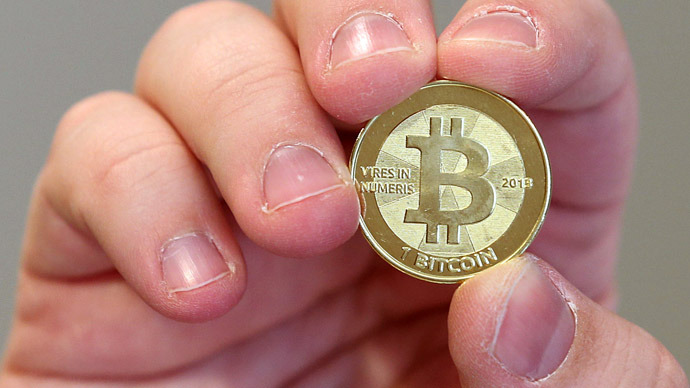‘Central banks looking at Bitcoin as real threat to dominance’

Governments and banking officials are watching Bitcoin in fear of losing their leading position to the virtual currency and the infrastructure building around it, Arwa Mahdawi, consultant, journalist and Bitcoin employee, told RT.
US Immigration and Customs Enforcement confirmed that there was an "ongoing investigation" that followed the blocking of the account of Dwolla, a business that allows users to convert U.S dollars into BitCoin and back again.
According to the Department of Homeland Security in the US, the peer-to-peer currency violates new laws that require online transfer systems to identify its users.
“The shutdown of Mt.Gox is a little bit worrying, it looks as if the US government wants to put a stranglehold on the kind of business that’s popping up around Bitcoin, but, crucially, it doesn’t affect much the currency itself. It’s just the exchanges around it and the US exchanges. And by the nature of it, Bitcoin being an international currency, shutting down an exchange like Mt. Gox, even if it affects the liquidity of Bitcoin, can’t kill Bitcoin.”
What’s more, the idea of rivalry between Bitcoin and regular currency is a relatively new phenomenon, as Mahdawi indicated.
“Central banks around the world are looking at the development of Bitcoin with a lot of fear, and not just central banks, but the traditional banking as a whole. If you think about it, Bitcoin has been around since 2008, it’s been around for ages. The regulators didn’t pay any attention to it whatsoever, they dismissed it as sort of monopoly money."
According to Mahdawi, just in the past few months, Bitcoin has
really gained legitimacy, we saw the huge spike in terms of its
value, we’re seeing investors pour money into Bitcoin.
"A couple of weeks ago, Union Square Ventures, a very
credible investment group, spent $5 million investing in Coinbase,
which is sort of a PayPal for Bitcoin. A lot of infrastructures are
building around Bitcoin, and that’s why the [Federal Reserve] is
looking at it as a real threat to its dominance,” she
said.
The virtual currency leads to people re-assessing the value and the meaning of money, Mahdawi stressed.
“The interesting thing about Bitcoin is that it’s made everybody start to talk about what money is, and why money has any value. If you think about it, since 1971, when the US came off the gold standard, the dollar hasn’t been linked to gold, it hasn’t been linked to anything. You have a piece of paper which says ‘In God we trust’ on it, but it isn’t the government we trust. That piece of paper is absolutely meaningless. You’re putting your trust into banks and central authorities. Bitcoin is a whole new idea of money when the money is basically regulated by network and by people.
Mahdawi believes that with people losing trust in governments,
the idea of something like Bitcoin is really gaining in popularity,
and people are beginning to realize that dollars are no more real
as a currency than something like Bitcoin and they are starting to
re-assess what the future of money is.
"Bitcoin isn’t going to wipe the dollar off the face of the Earth in the next few years, but I think we’re going to see the emergence of the alternative currencies in a world where traders buy through the internet, in a borderless world with the internet, so the idea of sovereign currency is starting to make less and less sense,” she said.
Mahdawi suggests that Bitcoin could represent a new path in the history of currencies.
“We’ve been in the recession now for several year, the eurozone crisis…People are starting to realize that the government isn’t the best people to put their money to, the government isn’t necessarily going to protect their money for them. So something like Bitcoin represents a call for alternative, [an idea] that you might be better off putting your money in technology rather than in the government. We’re seeing lots of governments beginning to scratch their heads and think about ways they could regulate Bitcoin, think about what things like Bitcoin means to them. Last October, the European Central Bank produced a paper on virtual currencies, and that was the first time that a public institution had produced any kind of meaningful document that looked at virtual currencies."
The journalist notes that if you look at the bibliography of
that document "you will find that the European Central Bank is
looking at Wikipedia articles, at Mashable articles trying to find
out what on Earth the virtual currency means for them."
"This week, in the UK, a lot of government officials and people involved in financial regulation got together to start thinking about what Bitcoin means for them. All over the world, the governments are starting to take note and kind of wonder what the future of money means, and how that’s going to affect their dominance,” Mahdawi added.
The statements, views and opinions expressed in this column are solely those of the author and do not necessarily represent those of RT.












